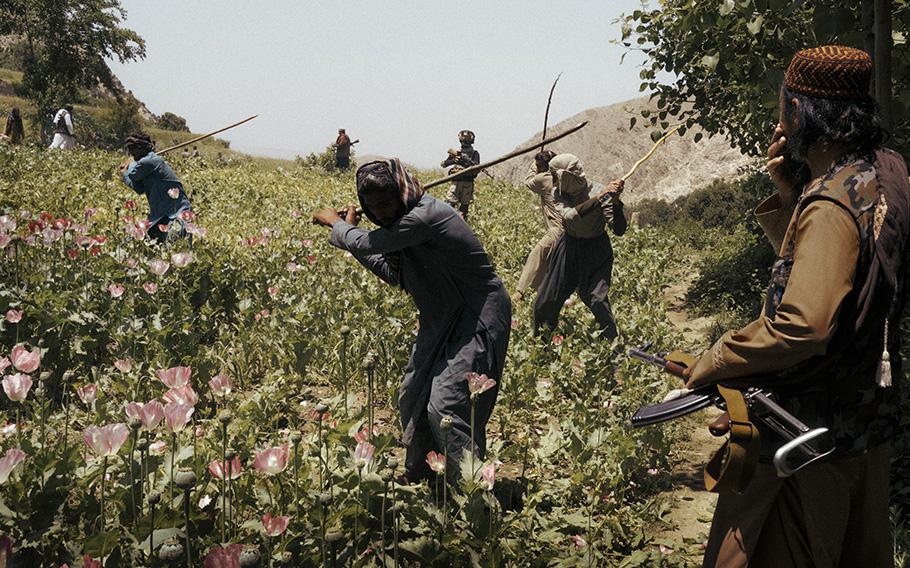
Taliban gunmen supervise day laborers as they destroy poppy fields in Baghdara (Lorenzo Tugnoli for The Washington Post)
ACHIN, Afghanistan — Delawar Torkhan, flanked by rifle-toting soldiers, rounded up the opium farmers and spoke loudly enough to ensure he was heard by everyone: the cowering men, the quietly fuming women - above all, his commanding officer perched in a nearby SUV.
"We told you months ago not to grow poppy. The supreme leader decreed it, and yet you don't listen," said Torkhan, a local Taliban security official. "If you continue, I will bring you to justice and jail you for six months."
In truth, it wasn't a threat. It was theater.
Under orders from their supreme leader, Haibatullah Akhundzada, Afghanistan's Taliban rulers in April 2022 banned the cultivation of poppy, a lucrative cash crop.
One year on, it's not clear whether the Taliban will soon make a significant dent on a crop that the United Nations estimated accounts for one-tenth of the entire Afghan economy. The country's poppy farmers supply the raw ingredients that, after being boiled into bricks, refined and exported to Europe via Iran and Pakistan, make up 80 percent of the world's opium and heroin supply. If the Taliban falls short, international analysts say, it'll be because of weak enforcement, corruption, the fact that no economic alternatives exist for farmers.
On the ground here in eastern Afghanistan, the case of one war-torn village abutting the snow-capped peaks of Pakistan's tribal regions shows how the eradication effort can be undermined by dissent and small acts of sympathy.
As his superior drove away on a hot recent afternoon, Torkhan, a 52-year-old who joined the Taliban in 1995, promptly released the detained opium growers, many of whom he has known for decades and belonged to his Shinwari tribe of Pashtuns.
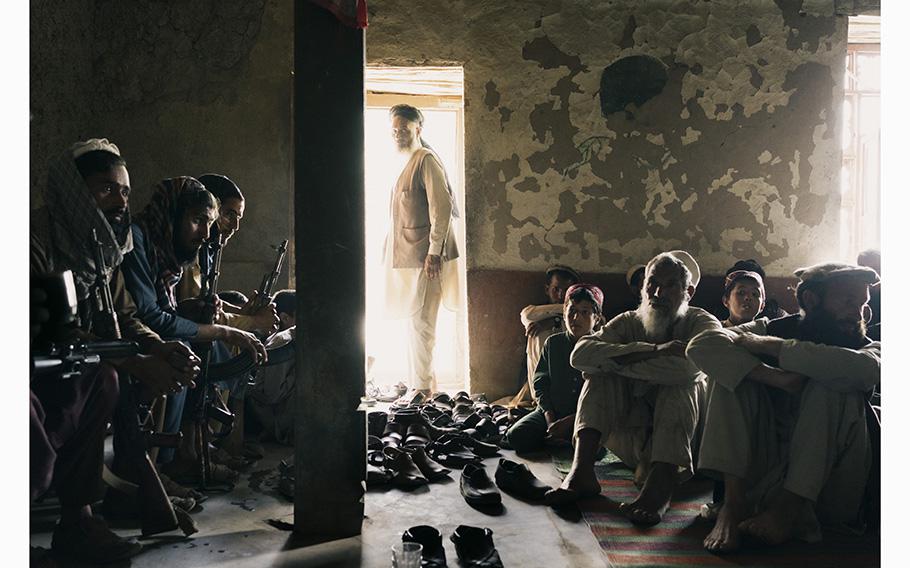
Farmers and Taliban gunmen gather in a former Islamic State courtroom in Baghdara. Islamic State fighters brutally enforced their will there after arriving from Pakistan in 2017. (Lorenzo Tugnoli for The Washington Post)
Torkhan walked through destroyed homes overlooking steep terraces carpeted by pink and white poppy flowers. The village has suffered enough, he sighed. Baghdara had been occupied by Islamic State fighters, who drove out locals and made it their mountain hideout. It was relentlessly shelled by the Taliban, seeking to drive out the Islamic State. After it joined the fight against the Islamic State, the U.S. military dropped the "Mother of All Bombs," its largest nonnuclear warhead, in an adjacent valley in 2017.
During its insurgency, even the Taliban itself had grown and taxed opium for years to fund its violent campaign. Now, Torkhan said, his own leaders were depriving war-weary villagers of their only hope of rebuilding.
When his eradication squads show up to smash poppy crops, women hurl insults from behind mud walls. The sick and the elderly beg him for money.
Torkhan confessed he feels racked by guilt when villagers confront him in the fields.
"But I would not be a good Muslim if I disobeyed orders from my supreme leader," he said. "God knows the sadness I bear in my heart."
Renewed eradication
Taliban leaders, viewing narcotics production as un-Islamic, banned poppy cultivation during the group's first stint in power 25 years ago. After the Taliban was overthrown in 2001, the new Afghan government persisted with eradication campaigns but found their reach limited in remote places like Baghdara, which was still effectively governed by the Taliban.
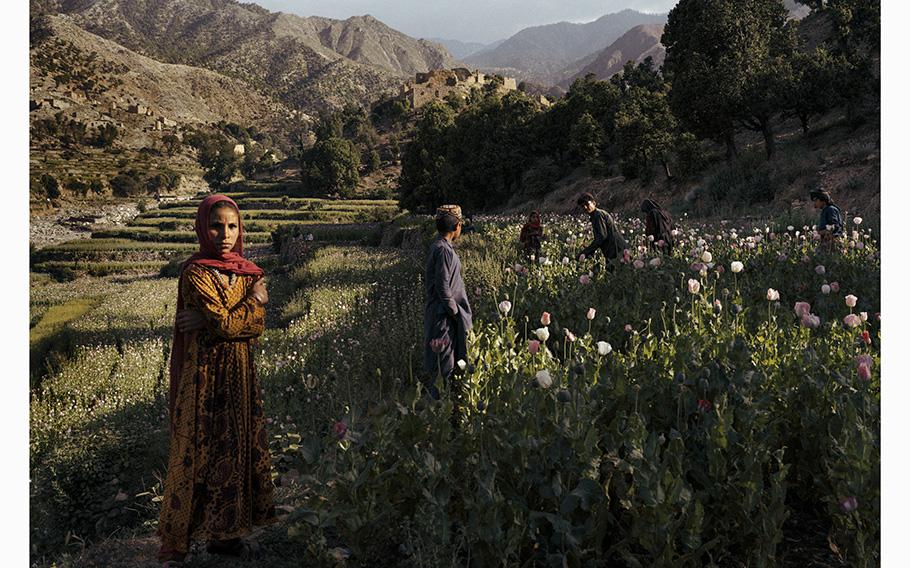
Farmers harvesting their poppy field watch workers hired by the Taliban government destroy another section of the field last month in Afghanistan’s Nanghahar province. (Lorenzo Tugnoli for The Washington Post)
Since seizing power again in 2021, Taliban leaders pledged once more to strictly crack down on narcotics production and trade. The move was interpreted by analysts as an attempt by the diplomatically isolated group to burnish its image as a responsible government, but the ban will come at a steep cost for the country, said Vanda Felbab-Brown, an expert at the Brookings Institution who has advised the U.S. government on Afghan drug policy. The families of some Taliban leaders, like senior officials in the previous Afghan government, rely on the illicit economy to generate considerable wealth, and countless farmers depend on it to avoid starvation, Felbab-Brown said.
"It is certainly plausible they will be able to induce fear-based elimination of poppy as they did in 1999," she said. "But can it hold? Well, no, unless they absolutely ruin the country. Poppy underpins the political and economic life of Afghanistan."
In Kabul, Taliban officials say their commitment to eradication is absolute. Since April, the start of the first harvest season since the ban was announced last year, eradication teams that have been deployed almost daily across the country have razed about 10,000 acres of poppy fields, said Haseebullah Ahmadi, chief of staff in the national counternarcotics office.
That amounts to scant progress. In November, the United Nations Office on Drugs and Crime estimated that 575,000 acres of opium were being cultivated in 2022, up 32 percent from a year prior. Opium sales generated $1.4 billion for Afghan farmers last year, worth nearly 30 percent of overall agricultural output, the U.N. agency calculated.
"It's almost everywhere," Ahmadi said as he scrolled through WhatsApp, showing videos sent in that morning from 10 different provinces. His men were bashing poppy plants with sticks in Kunduz. His tractors razed entire fields in Badakhshan.
"You can see we are committed to our promises and the decree of our supreme leader," he said enthusiastically.
In the provincial capital of Jalalabad, local Taliban officials were more tempered in their comments. Haji Atta Mohammad Qudrat, a regional counternarcotics official and Torkhan's superior, said the Taliban was working on a five-year plan to find replacement cash crops. Officials were hoping to teach farmers to grow hing, a pricey spice popular in South Asian kitchens, or expensive varieties of garlic.
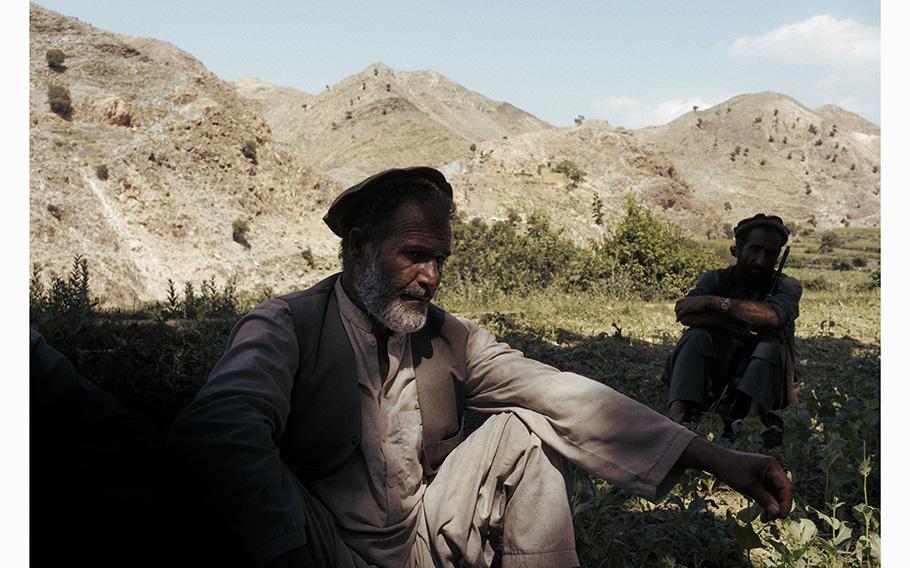
A Baghdara farmer sits with a Taliban gunman in a destroyed poppy field last month. (Lorenzo Tugnoli for The Washington Post)
"If there were a way to overlook poppy cultivation, we wouldn't put our people in further financial struggles," he said. "But we've clearly told them it absolutely won't be tolerated. We made a promise to the international community, and the villagers made a promise to us."
Rumblings of dissent
Among the craggy hills and steep ravines of Baghdara, Torkhan sounded the most conflicted among Taliban officials.
He was born nearby, in a neighboring district. As a young man, he fought Soviet soldiers in these hills while studying at Darul Uloom Haqqania, a seminary in Pakistan famed for producing jihadists. After he joined the Taliban, Torkhan rose to become the group's local shadow governor, levying taxes from opium crop and supplying weapons for the insurgency against the U.S.-backed Afghan government. When the Islamic State militants arrived, Torkhan said, he led the fight against them until he was captured in a night raid by Afghan special forces, only to be released as part of the Taliban's negotiations with the Afghan government in 2020.
"When I was a fighter, these mountains were my responsibility," Torkhan said. "I know everyone here. They used to come to my village."
Not that Torkhan - or any government - ever provided much in the way of services in the conflict-ridden district. "No one ever did anything for us, and that's why we're deprived," said Abdul Zarif, a village farmer. "No clinics, no roads, no schools. Our children walk six hours to class."
In 2017, life in the village of 1,000 people was upended by the arrival of fighters from Pakistan, who swore allegiance to the Islamic State and began to brutally enforce their will. Baghdara's residents - who were quickly outnumbered in their own village by a ballooning Islamic State population of 4,000 men, women and children - soon fled.
For the next four years, village residents became refugees in their own province, recalled Malik Mareph, the village chief. Some spent all their savings building shacks to live in the desert. Others tried to make a living as laborers in Jalalabad but struggled in the city. By the time they returned to Baghdara in 2021, most were badly in debt. They found their homes destroyed, their fields flooded. Many returned to opium, which fetched 130,000 Pakistani rupees ($470) per kilogram, about six times the price they could get for any other crop, Mareph said.
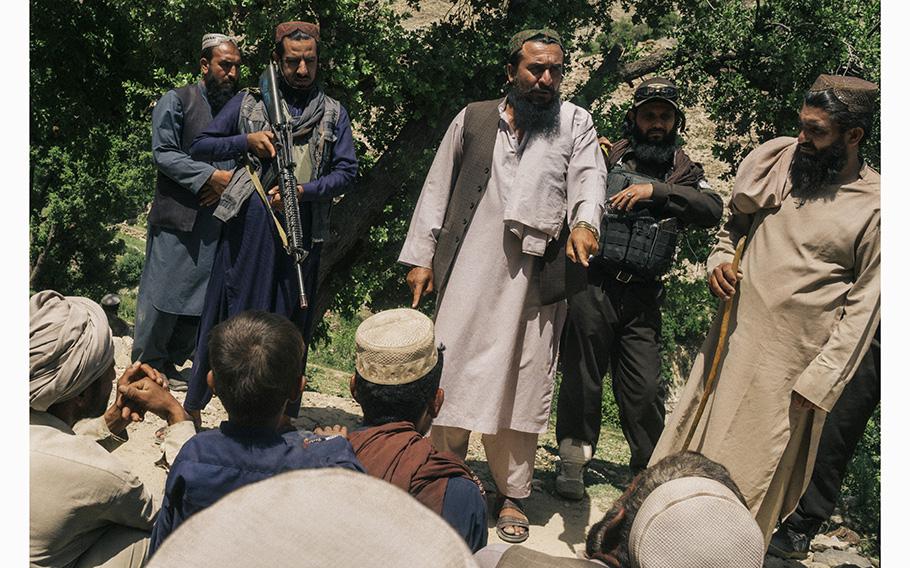
Taliban official Delawar Torkhan lectures farmers in the village of Baghdara against poppy production. (Lorenzo Tugnoli for The Washington Post)
On the day Torkhan's eradication team arrived, his men were bombarded by heckles.
"You don't have to worry while eagerly destroying our only source of income!" a woman shouted from a nearby home.
"If only you'd put so much effort in providing us food!" yelled another.
Inside a former guesthouse that had been turned by Islamic State militants into a courtroom for their severe judgments, Torkhan now sat cross-legged, listening to villagers vent.
Sedhan Shah, a man in his 30s, said a total of 30 rooms belonging to his extended family were demolished by shelling, and without opium, he could make only $1.50 a day by collecting firewood and selling it down the mountain, a seven-hour walk one way. Mareph, the village chief, said he couldn't remember the last time he ate meat. Villagers pointed to Seyasat, a 28-year-old who lost his right leg to an Islamic State land mine, now hobbling around on crutches. How will the village support him?
"Let us grow just one harvest to fix our houses, rebuild our roofs," Khana Gul, a village elder, demanded angrily. "We're not even growing to make a profit."
Torkhan heard the complaints and rubbed his eyes. He said he had already passed along the villagers' stories to his superiors and given their phone numbers to aid workers from the International Red Crescent.
Then, he made an unusual admission. In the presence of a reporter, he told the farmers that he deeply disagreed with the poppy ban. Before he arrived, he had warned the farmers to not let his superiors see them harvesting in the fields. And when he swore he would throw them in jail, Torkhan admitted, that was an empty threat.
"I call upon the Islamic Emirate of Afghanistan to provide assistance to these villagers," he said loudly, referring to the Taliban government. "If you're suffering, I'm suffering. The last few months of this campaign have been the worst in my life."
By now, the sun was low in the sky, and scores of women and children who had heckled Torkhan were back in the poppy fields, rushing to collect as much milky sap as they could even as advancing eradication workers whacked plants a few yards away. Torkhan's fighters watched the scene from the hillsides, seemingly uninterested.
"Please support our mujahideen," Torkhan said into a loudspeaker, making one final appeal as he and his men piled into a Toyota pickup truck.
It didn't make a difference. In the sea of pink and white, the farmers ignored him, and he let them be as he drove down the mountain, saying nothing at all.